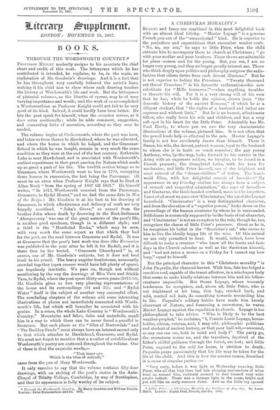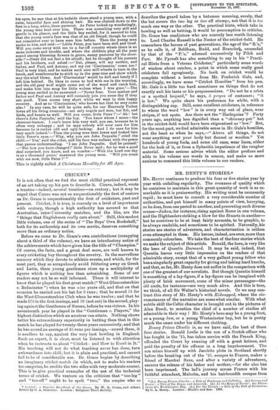. A CHRISTMAS MORALITY.*
REALITY and fancy are combined in this most delightful book with an almost ideal felicity. "Master Lepage" is a genuine French peasant of the "emancipated " kind. He is superior to the prejudices and superstitions that encumber weaker souls. " No, no, my son," he says to little Peter, when the child entreats him to accompany them to church at Christmas ; "go with your mother and your brothers. These shows are admirable for pions women and for the young. But, you see, I am no longer very young, and they no longer greatly interest me. Those who think deeply upon politics and philosophy outgrow the satis- faction that others derive from such devout illusions." But he is not superior to hating the Prussians. " Twenty thousand cut-throat Prussians !" is his favourite exclamation—his new substitute for "Mille tonnerres !"—when anything troubles or thwarts his will. For it is a very strong will of his own that he has, while Ile holds the opinion, drawn from "the domestic history of the ancient Romans," of which be is a diligent student, that "the rights of a husband and father are supreme and without limit." But he is an honest, affectionate fellow, who really loves his wife and children, and has a very soft spot in his heart for the little Peter. Admirably has Mr. Paul Hardy, to whose pen we owe the very characteristic illustrations of the volume, pictured him. It is not often that the pencil lends help so effectual to the pen. Master Lepage's family is not lees excellently drawn than himself. There is Susan, his wife, the devout, patient woman, loyal to the husband to whom she is in truth so much superior ; the gay young Anthony, who, by-the-way, looks forward to Isis service in the Army with an eagerness seldom, we imagine, to be found in a French peasant ; the thoughtful Luke, with his turn for mechanics ; and little Peter himself, one of the brightest and most natural of the " dream-children " of fiction. The hand- maid Eliza, with her delightful conceit of herself—(" My appearance in my fete-day clothes has always been a subject of remark and respectful admiration," ehe say s of herself)— and Gustavus, the thick-headed cowherd, must not be forgotten. Least of all must we pass over 'Cincinnatus,' the cat of the Lepage household. Cincinuatus ' is a very distinguished character, and from the elevation of a "superior person," looks down on the proceedings of the human creatures by whom be is surrounded. Selfishness is commonly supposed to be the basis of catcharacter, and 'Cincinnatus ' is not an exception to the rule, though he, too, recognises the charm of little Peter's presence. Great as he is, he recognises his better in the " Sacristan's cat," who seems to him to live the ideally happy life of the wise. Of this animal we are only permitted to hear. It would, indeed, have been difficult to make a creature "who knew all the feasts and fast- days in the Church calendar as well as the Sacristan himself, and "had not eaten a mouse on a Friday for I cannot say how long," equal to himself.
But the principal character in this " Christmas morality " is John Paqualin, the charcoal-burner. With him, fate has lodged a sensitive son], capable of the truest affection, in a misshapen body that seems to make kindly relations between him and his fellow- creatures impossible. But Susan Lepage, whose womanly tenderness he recognises, and, above all, little Peter, who i8 not frightened of his long, thin legs, crooked back, and wild, matted red hair, do something towards reconciling him to life. Paqualin's solitary habits have made him keenly observant of Nature, and foreseeing a snowstorm, he warns Master Lepage against the expedition to church. Impage is too philosophical to take advice. "Who is likely to be the best weather.prophet," he exclaims, "I, Francis Louii Lepage, house- holder, citizen, veteran, and, I may add, philosophic politician and student of ancient history, or that poor half-wit,—unsound, as any one can see, both in mind and body F" The party go, the snowstorm comes on, and the travellers, deprived of the father's skilful guidance through the forest, are lost ; and little
Peter, exposed to the cold for hours, is stricken to death. Paqualin prays passionately that his life may be taken for the life of the child. And this is how the answer comes, described in a scene of singular pathos :—
" Very early, before it wee light on Wednesday morning, little Peter, who all that long time had lain sleeping unconscious of what went on around him, suddenly seemed to find himself very wide awake indeed. There was a strange light in the room, bright and yet soft like an early summer dawn. And as the little boy opened • .:ttlf,oreter: a Christmas Morality for Children of Any Age. By Lucas mu don Kagan Paul, Trench, and Co. 1888.
his oyes, he saw that at his bedside there stood a young man, with a calm, beautiful face and shining hair. He was clothed down to the feet in a long, white, linen garment. As Peter looked up wonderingly, the young man bent over him. There was something very still and gentle in his glance, and the little boy smiled, for it seemed to him that the young man's face was that of an old friend, though he could not remember ever to have seen him before. Then the young man spoke to him, and said Little Peter, you have been sick and tired. Will you come away with me to a far-off country where there is no more sickness and trouble, and where the children play all the year round among blooming flowers in green, sunny pastures by the river- side ?'—Peter did not feel a bit afraid ; but he thought of his parents and his brothers, and asked But, please, will my mother, and father, and Paul, and Antony, and my cat Cincinuatos,' come too ? Paul is very kind, and he makes such nice mill-wheels to turn in the brook, and weathercocks to stick up in the pear.tree and show which way the wind blows. And 'Cincionatns' would be dull and lonely if I left him behind. He likes to come to bed with me in the morning, and the old grey wolf might come out of the wood and catch him, and make him into soup for little wolves when I was gone.'—The young man smiled as be answered Never fear. Your mother and father and Paul and Antony will certainly join you some day if they are good. Time seems very short while we wait in that happy country. And as to 'Cincinnatus,' who knows but that he may come also ? In any case, he will be quite safe, for our Heavenly Father loves all his living creatures—not only angels and men, bat fish, and birds, and beasts as well. Will you come, little Peter F'—' Ale ! but there's John Paqoalin,' said the boy. ' You know whom I mean—the charcoal•buruer. I can't leave him very well, you see, because he is often very unhappy ; and he says nobody will ever care for him because he is rather odd and ugly-looking. And I do care for him very mach indeed!—Then the young man bent lower and looked into little Peter's eyes.—' Why, why you are John Paqualin !' oried the child.—' Yee,' said the other, and his face was radiant with the peace that passes understanding. I am John Pagnalin. God be praised.' —' But how you have changed !' little Peter said ; for he was a good deal surprised, you know, and no weeder.—' With the Lord one day is as a thousand years,' answered the young man. ' Will you come with me now, little Peter ?' "
This is rightly called A Christmas Morality for Alt Ages.
























































 Previous page
Previous page